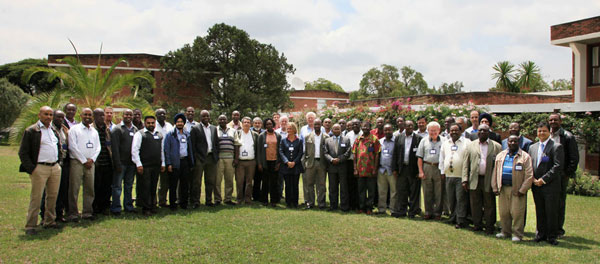Farm mechanization has progressed little if at all in sub-Saharan Africa, due to a lack of demand, promotion of unsuitable or unreliable machines, little support infrastructure, promotion of inappropriate machinery, an overriding development focus on seeds and fertilizer, and negative perceptions about the social and equity effects of mechanization.
During 10-13 April 2012, more than 50 participants from 12 countries in eastern and southern Africa took part in a workshop organized by the CIMMYT global conservation agriculture program to re-explore the issue and help develop a proposal for the project “Mechanization, entrepreneurship, and conservation agriculture to leverage sustainable intensification in eastern and southern Africa” (MELISA), which will build upon the ACIAR-funded project SIMLESA. The group included agronomists, socioeconomists, agricultural engineers, and private sector representatives.
Re-opening the debate about mechanization was deemed timely because farming in the region relies on increasingly fewer draft animals, tractor hiring schemes have collapsed, field labor is in ever-shorter supply, and the extreme drudgery of many farm operations often falls to women and generally makes agriculture unattractive to the young.
The project is expected to build on experiences with small-scale, intensified farming systems in South Asia—for example, 80% of all operations in Bangladesh are mechanized and mostly done by service providers—and on SIMLESA networks and activities to test and promote conservation agriculture. Both small-scale mechanization and conservation agriculture promise to improve smallholders’ “power” budget: mechanization increases the supply, whereas conservation agriculture reduces the demand by about half; thus smaller, more affordable sources of power, such as two-wheel tractors, can be used. Similarly, shifting from draft animals to tractors would free up substantial biomass (a pair of oxen consumes about nine tons of forage per year) that can be left as residues on the soil. As specific objectives, MELISA will:
- evaluate and demonstrate small-scale motorized conservation agriculture technologies in Ethiopia, Kenya, Mozambique, Malawi, Tanzania, and Zimbabwe, using expertise, knowledge, skills, and implements from Africa, South Asia, and Australia;
- test site-specific market systems to support mechanization in those countries;
- identify improvements in national policies and markets for wide adoption; and
- create awareness and share knowledge about mechanization.
The project will be submitted to ACIAR Australia and, if approved, could start in late 2012.


